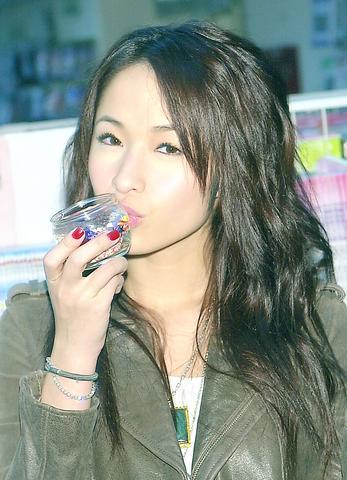Tomorrow is Valentine's Day and if you haven't lined up a more intimate, two-person way of spending the evening, then you can always come out to the Panchiao Sports Arena and join tens of thousands of Mando-pop fans for the Hope of Love Concert, featuring four of the heavyweights of Chinese music.
For this special event, a portion of the ticket sales will go to the Good Shepherd Sisters charity foundation, organizers have signed on Elva Hsiao (蕭亞軒), Lee Hom Wong (王力宏), David Tao and Eason Chan (陳奕迅) for an evening of syrupy love ballads certain to pull on heartstrings and get the glow sticks waving back and forth.

PHOTO: TAIPEI TIMES
The show will be the first time that these four singers take the stage together and is the only noteworthy event on the Mando-pop calendar for about as far as the eye can see, quite likely because promoters wouldn't want to schedule an event within a month on either side of the concert's date. That's how much star power will be in the house tomorrow night.
Last November Tao held a solo concert in Taipei that drew over 50,000 people, which broke the concert attendance record that had only recently been set by Mayday (五月天); while Wong, for his part, attracted over 20,000 to a solo gig last fall. Add Hsiao, one of Taiwan's leading KTV divas, and Chan, a long-standing Canto-pop star, to the mix and one gets a winning lineup to pack the house. Or at least, that's what one would expect.
Organizers have been aiming for a crowd of 50,000 and though ticket sales were slow earlier in the week that could change with the weather.
Tickets for the Hope of Love Concert are available through Era Ticketing and run from NT$900 to NT$2,000. Doors open at 5:30pm and the music starts at 7pm. The Panchiao Sports Arena is located at 8 Chungcheng Rd, Panchiao, Taipei County (

May 11 to May 18 The original Taichung Railway Station was long thought to have been completely razed. Opening on May 15, 1905, the one-story wooden structure soon outgrew its purpose and was replaced in 1917 by a grandiose, Western-style station. During construction on the third-generation station in 2017, workers discovered the service pit for the original station’s locomotive depot. A year later, a small wooden building on site was determined by historians to be the first stationmaster’s office, built around 1908. With these findings, the Taichung Railway Station Cultural Park now boasts that it has

The latest Formosa poll released at the end of last month shows confidence in President William Lai (賴清德) plunged 8.1 percent, while satisfaction with the Lai administration fared worse with a drop of 8.5 percent. Those lacking confidence in Lai jumped by 6 percent and dissatisfaction in his administration spiked up 6.7 percent. Confidence in Lai is still strong at 48.6 percent, compared to 43 percent lacking confidence — but this is his worst result overall since he took office. For the first time, dissatisfaction with his administration surpassed satisfaction, 47.3 to 47.1 percent. Though statistically a tie, for most

As Donald Trump’s executive order in March led to the shuttering of Voice of America (VOA) — the global broadcaster whose roots date back to the fight against Nazi propaganda — he quickly attracted support from figures not used to aligning themselves with any US administration. Trump had ordered the US Agency for Global Media, the federal agency that funds VOA and other groups promoting independent journalism overseas, to be “eliminated to the maximum extent consistent with applicable law.” The decision suddenly halted programming in 49 languages to more than 425 million people. In Moscow, Margarita Simonyan, the hardline editor-in-chief of the

Six weeks before I embarked on a research mission in Kyoto, I was sitting alone at a bar counter in Melbourne. Next to me, a woman was bragging loudly to a friend: She, too, was heading to Kyoto, I quickly discerned. Except her trip was in four months. And she’d just pulled an all-nighter booking restaurant reservations. As I snooped on the conversation, I broke out in a sweat, panicking because I’d yet to secure a single table. Then I remembered: Eating well in Japan is absolutely not something to lose sleep over. It’s true that the best-known institutions book up faster